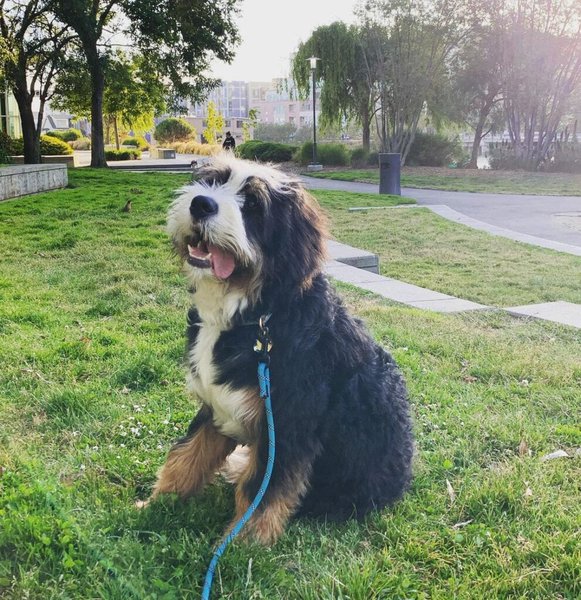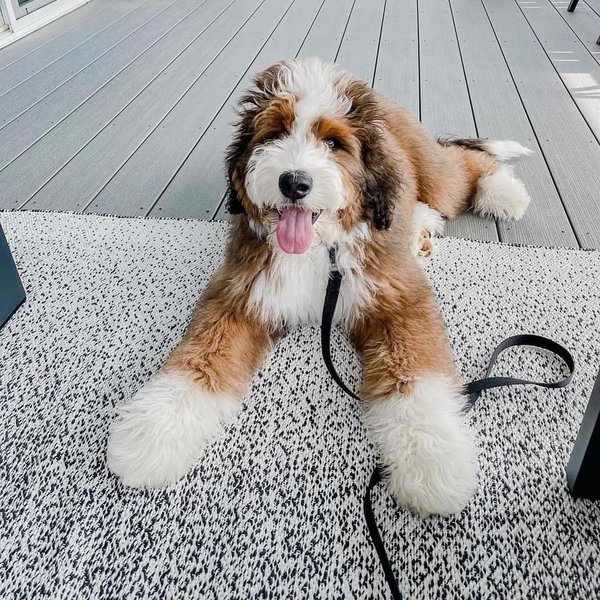Designer dogs have rapidly grown in popularity over the years. People have come to appreciate the combined characteristics offered by designer dogs. This is undisputedly true for the Bernese Mountain Dog and Poodle crossbreed. So, what are Bernedoodles?
The Bernedoodle is a crossbreed of the Bernese Mountain Dog and the Poodle. The Bernedoodle breed can manifest in several ways depending on their combination of genes, resulting in Bernedoodles of various sizes and colors. This designer dog is an intelligent, adaptable, and friendly breed. They are widely adored for their energetic and affectionate nature.
The Bernedoodle is quite an intriguing dog breed. We will dive further into understanding what you, as a dog owner, should know about the Bernedoodle’s health and how to take care of a Bernedoodle. However, let us first discuss whether the Bernedoodle would be an ideal family dog.
Are Bernedoodles Good Family Dogs?
Bernedoodles have the potential to be ideal family dogs because both their parents, the Poodle and Bernese Mountain Dog, are breeds who enjoy being in the company of their family. However, this can only be achieved with proper training.
Origins And History
The first designer Bernedoodle was first bred in 2003 by Sherry Rupke. Rupke intended to counter the health issues that Bernese Mountain Dogs are exposed to and increase their lifespan while maintaining their positive character traits.
She produced a successful crossbreed of the Bernese Mountain Dog and Poodle that met her expectations. The Bernedoodle is healthier and has a longer lifespan than the Bernese Mountain Dog while exhibiting positive character traits from both their parents.
The Bernedoodle inherited character traits such as patience, intelligence, playfulness, and affection from their parents, making them good family dogs if properly trained.
Aside from being good family dogs, Bernedoodles are ideal dogs for first-time owners because they are intelligent, patient, and hypoallergenic. First-time owners, who are opting to add a Bernedoodle to their family, must have the time to train and care for their Bernedoodle.
Size
The Standard Bernedoodle is a Standard Poodle crossbred with a Bernese Mountain Dog. These Bernedoodles are typically 23 to 29 inches tall and weigh between 70 and 90 lbs.
If you mixed a Miniature Poodle with a Bernese Mountain Dog, you would get a miniature Bernedoodle. Miniature Bernedoodles are about 18 to 22 inches tall and weigh 25 to 49 lbs.
The tiny Bernedoodle is a result of the tiny Poodle and Bernese Mountain Dog being crossbred. Tiny Bernedoodles are typically 12 to 17 inches tall and weigh 10 to 24 lbs.

What Is The Life Expectancy Of A Bernedoodle?
The lifespan of a Bernedoodle is approximately between 12 and 18 years. However, smaller Bernedoodles tend to have a longer lifespan than standard-sized Bernedoodles.
Drooling
Unlike Bernese Mountain Dogs, Bernedoodles are typically not renowned as dogs that drool. However, this does not mean that they do not and can not drool at all.
Your Bernedoodle can drool for several reasons, such as stomach discomfort, dental issues, or organ-related diseases.
Dental Issues
Dental conditions such as gingivitis can cause your Bernedoodle to release excess saliva and their teeth to fall out. Gingivitis is an inflammation of your dog’s gums. It is also the initial stage of a gum-related disease – periodontal disease. Fortunately, gingivitis can be treated by your veterinarian.
Organ-Related Diseases
Sudden drooling or excessive drooling can be a sign that your Bernedoodle’s organs are not functioning as they should be. These organ issues include liver and kidney diseases.
If your dog suddenly begins to drool excessively and will not stop, you should consult your veterinarian. If it is something serious, early diagnosis will prevent your dog from experiencing prolonged suffering.
Common Health Issues
The Bernedoodle is typically a healthy breed. With that being said, it is important to note that the Bernese Mountain Dog and Poodle crossbreed has not been around long enough for conclusive evidence regarding their health to be gathered.
Bernedoodles are not as exposed to health issues that Bernese Mountains Dogs are commonly susceptible to, such as different forms of cancer. However, like many large dogs, Bernedoodles are predisposed to hip and elbow dysplasia.
Bernedoodles are also vulnerable to epilepsy, progressive retinal atrophy, Addison’s disease, and thyroid issues. We recommend health screening for your puppy to prevent any health issues or ensure early diagnosis of any disease that your puppy may have.

How To Take Care Of Bernedoodles?
Diet
The amount of food that you should feed your Bernedoodle, is dependent on its size, level of physical activity, and age. However, they should typically feed your Bernedoodle puppy about four times per day until they are fully mature.
The frequency of your Bernedoodle’s meals is not the only important factor, and you should also ensure that you feed your Bernedoodle high-quality meals. Pet Plate supplies delicious and nutrient-rich meals that your Bernedoodle will love.
We also recommend investing in multivitamins and fish oil supplements. Omega-3 fatty acids and multivitamins support your Bernedoodle’s joints, bones, and immune system, helping prevent the development of hip and elbow dysplasia.
Physical Activity
Bernedoodles are bred from two classes of working dogs, so they are a highly energized breed. The Standard Bernedoodle needs a minimum of an hour of physical activity play sessions every day.
The Miniature and Tiny Bernedoodles require less physical activity each day. You should allow your Bernedoodle puppy to rest adequately so that it can grow in a healthy manner. Excessive physical activity will increase your Bernedoodle exposure to hip and elbow dysplasia.
We would recommend taking your Bernedoodle on frequent walks or having lovely afternoon play dates with your Bernedoodle.
Sleeping Pattern
Sleep is a vital part of your Bernedoodle puppy’s growth. Bernedoodle puppies are even more energetic than matured Bernedoodles because the world is new to them, and they are curious.
You need to establish a sleep schedule for your Bernedoodle puppy. As much as they may initially fight their naps, with training and consistency, they may grow to look forward to their nap time. Your Bernedoodle puppy should typically nap every two to three hours every day.

Are Bernedoodles Aggressive? Temperaments Of Bernese Mountain Dog Poodle Mixes
Temperaments
Bernedoodles are renowned for their excellent temperament, which they inherit from the Poodle and Bernese Mountain Dog. Bernedoodles are patient, intelligent, energetic, and typically would enjoy spending more time with their family rather than being left alone.
Bernedoodles are an affectionate breed, and they would appreciate each second that you spend with them. They especially adore cuddling with their family. But, if they feel neglected and develop a sense of loneliness, they may become uncharacteristically aggressive.
Trainability
Although Bernedoodles are an easy breed to train because of their intelligence, they can also be quite stubborn, which is a trait that they inherited from their Bernese Mountain Dog parent.
However, with patience and adequate research, you will be able to easily train your Bernedoodle. We suggest introducing your Bernedoodle puppy to other people, places, and dogs from a young age.
Early socialization will ensure that your Bernedoodle puppy grows up to be a sociable, friendly, and confident dog. Each training session should be fun (as far as possible) and involve some form of reward for positive behavior.
Rewards can include treats, words of affirmation, and even a pat on the head or a tummy rub. When training your Bernedoodle, remember that patience is the keyword.

Do Bernedoodles Need Haircuts? Grooming Tips For Bernese Mountain Dog Poodle Mixes
Bernedoodles typically have long and wavy hair. To maintain the lush beauty of your Bernedoodle’s fur coat, we recommend following these tips:
Brushing
You should brush your Bernedoodle’s fur coat at least 2 to 3 times each week to ensure that its hair does not become tangled or develop mats. Mats are an absolute headache to deal with and could be harmful to your Bernedoodle’s health.
Sometimes brushing is not enough to remove all the loose hair, especially for breeds such as Bernedoodles. The FURminator Undercoat Deshedding Tool can reach below the top surface of the hair and remove all loose hair without harming your Bernedoodle.
Haircuts
Along with brushing your Bernedoodle’s hair to prevent tangles and mats, you should also trim their hair every 6 to 8 weeks. If you are not comfortable enough to do it by yourself, you can take your Bernedoodle to a professional groomer.
Bath
When bathing your Bernedoodle, make sure that you do not overdo it. Excessively bathing your dog will strip them of essential oils protecting their fur coats, thereby doing more harm than good.
We recommend bathing your dog every 3 to 4 months. Since Bernedoodles have such long and luscious fur coats, you need to use the correct products to ensure that you maintain the health of their fur coat. We recommend using the Mighty Petz 2-In-1 Shampoo and Conditioner.
Are Bernedoodles Hypoallergenic?
Bernedoodles are a hypoallergenic breed that experiences minimal shedding because of the genes that were passed down to them by their Poodle parent.
However, this is by no means saying that all Bernedoodles have low-shedding fur coats. Some Bernedoodles significantly more than other Bernedoodles because they did not inherit the minimal shedding gene from their Poodle parent.
These Bernedoodles inherited the shedding gene from their Bernese Mountain Dog parent.
Related Questions
Why Are Bernedoodles So Expensive? The Bernedoodle is a widely sought-after designer breed. They are adored for their beautiful multi-colored fur coats. The cost of a Bernedoodle depends on whether you buy or adopt them. The price for buying a Bernedoodle typically ranges between $500 and $5,000.
Are Bernedoodles Healthier Than Bernese Mountain Dogs? Yes, Bernedoodles are indeed healthier than Bernese Mountain Dogs. Bernedoodles were bred with this very objective to achieve a breed far healthier than the Bernese Mountain Dog.
Do Bernedoodles Get Along With Cats? Yes, Bernedoodles do get along with cats. Bernedoodles are an affectionate and friendly dog breed that does not have high prey drive, thereby allowing them to get along with smaller animals like cats.





